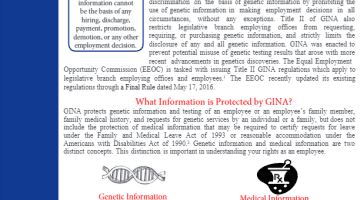Title II of the Genetic Information Nondiscrimination Act (GINA) of 2008, protects legislative branch employees from employment discrimination on the basis of genetic information by prohibiting the use of genetic information in making employment decisions in all circumstances, without any exceptions. Title II of GINA also restricts legislative branch employing offices from requesting, requiring, or purchasing genetic information, and strictly limits the disclosure of any and all genetic information. GINA was enacted to prevent potential misuse of genetic testing results that arose with more recent advancements in genetics discoveries. The Equal Employment Opportunity Commission (EEOC) is tasked with issuing Title II GINA regulations which apply to legislative branch employing offices and employees.1 The EEOC recently updated its existing regulations through a Final Rule dated May 17, 2016.
What Information is Protected by GINA?
GINA protects genetic information and testing of an employee or an employee’s family member, family medical history, and requests for genetic services by an individual or a family, but does not include the protection of medical information that may be required to certify requests for leave under the Family and Medical Leave Act of 1993 or reasonable accommodation under the Americans with Disabilities Act of 1990.2 Genetic information and medical information are two distinct concepts. This distinction is important in understanding your rights as an employee.
Genetic Information
Genetic information includes information about an individual or their family member’s genetic tests, as well as information about the manifestation of a disease or disorder in an individual’s family (i.e. family medical history). Family medical history is included in the definition of genetic information because it is often used to determine whether someone has an increased risk of getting a disease, disorder, or condition in the future.

